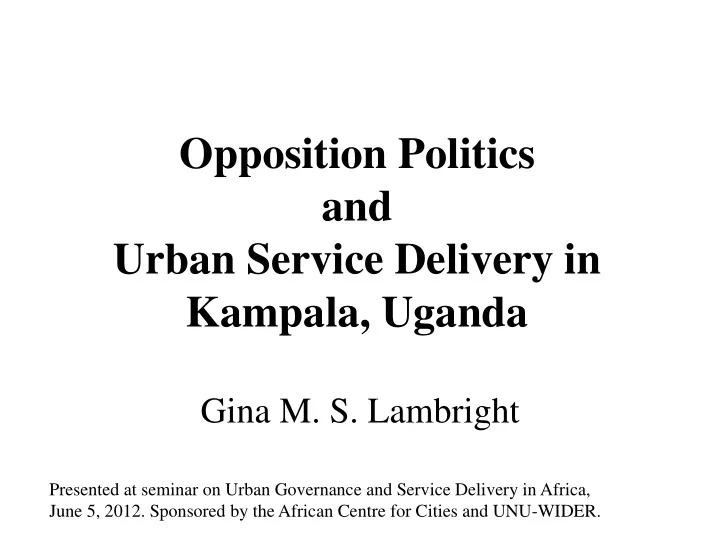

Opposition Politics and Urban Service Delivery in Kampala, Uganda Gina M. S. Lambright Presented at seminar on Urban Governance and Service Delivery in Africa, June 5, 2012. Sponsored by the African Centre for Cities and UNU-WIDER.
Motivations for Research • How does partisan politics affect service delivery in Uganda’s urban areas? • To what extent does partisanship account for performance of Kampala’s municipal government?
Ugandan Context • Ruled by National Resistance Movement (NRM) since 1986 • Classified as “partially free” – Return to multiparty politics in 2005 – Yoweri Museveni serving 4 th term • Decentralization policy institutionalized in 1995 constitution, 1997 LG Act, and amended in 2005 LG Amendment Act – Recentralization underway
Kampala and Entebbe • Kampala is Uganda’s capital and largest city – 1.2 million residents (as of 2002 census); population doubles with daily commuters – Serves as commercial, business and administrative center • Entebbe is considerably smaller – Only 55,000 residents (2002) – Best known for green spaces, tourist attractions
Kampala and Entebbe Political opposites ; mirrored political realignments in 2011 Entebbe Municipal Kampala City Council Council (EMC) (KCC) • Entebbe mayor for last 18 • Opposition, Democratic years, Stephen Kabuye Party (DP), dominated (NRM) council until 2010 • DP won mayoral seat and • Today DP mayor in a majority of council seats in ceremonial position; NRM 2011 won majority council seats in 2011
Performance of KCC and EMC • Kampala: Nicknamed “the dirty city”; “city of garbage mountains”; considered one of most corrupt local governments in Uganda • Entebbe: 2008’s Best Overall Urban Council; 2009’s Best Performing Higher Local Government in Central Region • Despite perceptions, urban councils face similar challenges
Summary of Findings • Politics undermines LG service delivery, particularly provision of services to urban poor – NRM tendency to use decentralization as political tool • Politicization of tax policy (elimination of g-tax, owner-occupied property rates) • Limited fiscal decentralization; LG dependence on conditional grants • Poor budget performance; off-budget expenditure and supplementary budgets • Creation of new districts
Summary of Findings • Partisanship matters, but effect on LG performance not straightforward – Opposition control of KCC certainly shapes NRM response and behavior toward the council – Yet, partisanship insufficient explanation for KCC’s poor record of service provision Or EMC’s good record
Kampala and Entebbe • Policy discretion of both councils limited • Elimination of taxes reduced discretion further; increased dependence on transfers • Limited evidence that opposition KCC “starved” of resources – Financial transfers to KCC no slower than EMC – Budget performance for KCC and EMC comparable – KCC gets larger transfer overall, but smaller per capita transfer than EMC and “average” district
Kampala and Entebbe • Distinction between legally entitled resources and sufficient resources to meet city’s urban challenges “The sources [of financing] to Kampala were like to a district. They were not commensurate with the tasks. The financing was very low. The reform tackled the financing [gap]…we increased the money and the central government is taking over the administration (interview with Commissioner, Ministry of Local Government, May 2011).”
Kampala and Entebbe • Some observers attribute this to Kampala’s political opposition “The central government wanted to show that the opposition couldn’t do anything. So it didn’t give Kampala the attention it needed … The government wouldn’t dump the money needed into KCC while the opposition controlled it. So government wouldn’t give the opposition credit” (anonymous interview with former KCC official, June 2011).
Kampala and Entebbe • Direct interference in KCC affairs by NRM undermines service provision – Overturn KCC policy decisions E.g. Nullification of boda boda tax – Numerous landgrabbing cases E.g. NWSC plant in wetlands E.g. Relocation of KCC mechanical shop E.g. Mayor’s and Town Clerk’s residences – Institutional restructuring; creation of Kampala Capital City Authority (KCCA) – Link to Kampala’s political, commercial importance
KCCA • Created in 2009 with Kampala City Act • Weakened authority of locally elected officials – Mayor now a ceremonial position – Eliminated executive committee • Vests power in Executive Director; appointed by and accountable to President • Creates new ministerial position, Minister of Kampala, with power to veto/direct actions of KCCA
KCCA • Reform likely politically motivated – Reinforces NRM narrative about poor performance of KCC – Electoral strategy to woo urban voters through improved service delivery – Effort to gain direct control over policy decisions with economic implications for key allies • Effects of reform mixed – Some visible successes: renewed focus on solid waste management; eradication of street vendors, boda bodas
KCCA – Evidence of business as usual, however • Squabbles between ED and Lord Mayor • Corruption allegations • No windfall from CG • Large salaries for ED and other KCCA
Kampala and Entebbe • Interference in EMC’s work indirect – State House presence shifts council priorities
Donor Reactions • Concerns about ongoing recentralization, worsening service delivery • Continuation of donor funded projects in Kampala despite these concerns • Shift away from donor funding of decentralization • Reinforces centralizing trend
Conclusions • General trend of worsening service provision in Uganda – Linked to rising corruption; “inflationary patronage” • Unlikely that urban councils can buck broader trend • CG interference in urban governance has not historically benefited urban poor • Outcomes going forward depend on political calculations by NRM of costs/benefits of improved urban governance
Recommend
More recommend